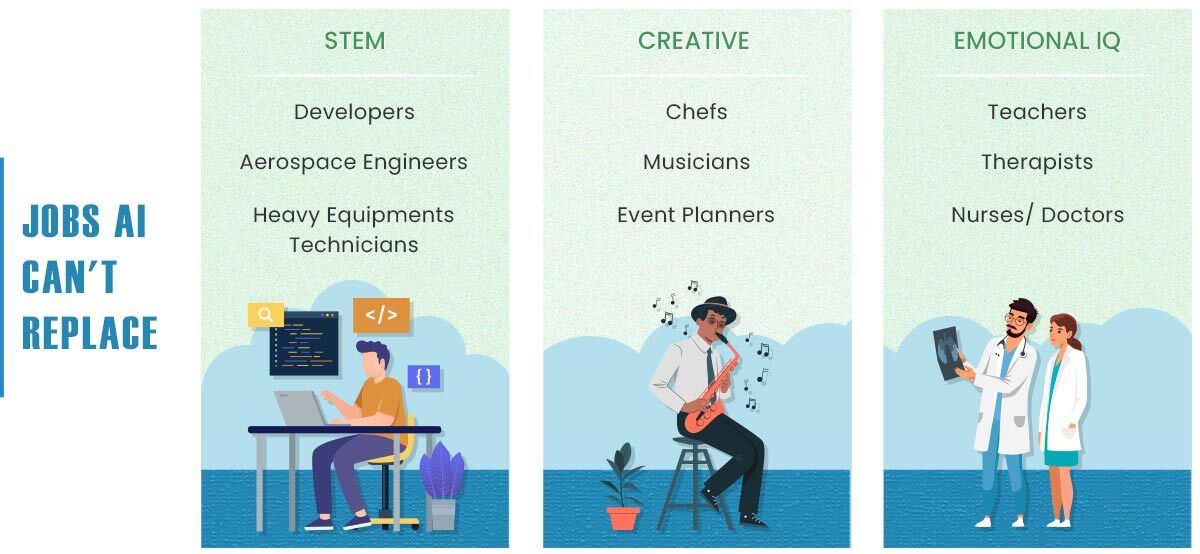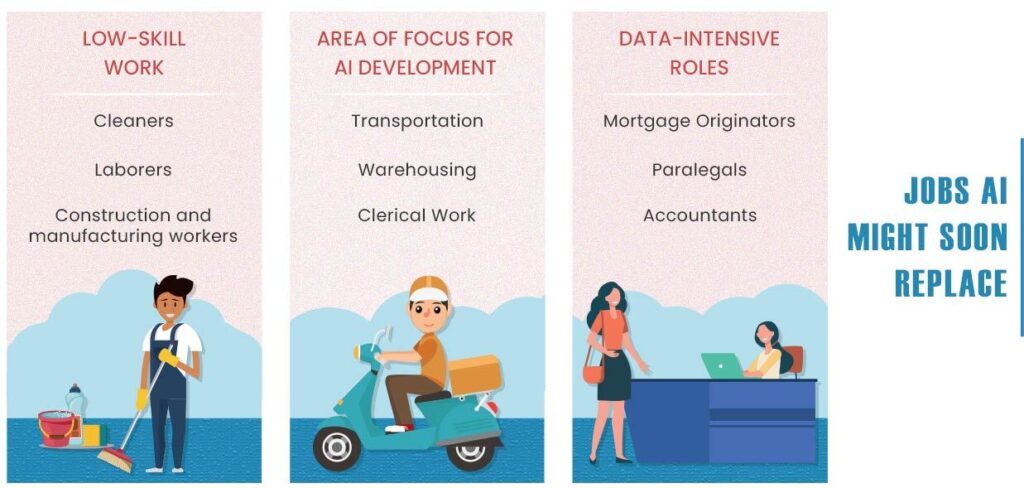Jobs AI Can and Cannot Replace: An Extensive Analysis of AI’s Capacity to Replace Jobs
Artificial intelligence (AI) has become a powerful force for change that is reshaping numerous aspects of our daily lives. The workplace is one of the main areas where AI has made substantial progress. Even though AI has the capacity to automate jobs, there are still plenty of jobs that call for human skills. This article will examine the types of jobs that AI can and cannot replace in order to provide insight into how the current workforce is changing.
Jobs that AI might take over
Routine and Repetitive Tasks
Routine and repetitive tasks, such as document analysis, basic customer service interactions, sorting, and data entry, are ideally suited for automation through AI algorithms. By harnessing the power of AI, businesses can streamline their operations, enhance efficiency, and minimize the risk of human error. This transformative technology empowers organizations to optimize their processes, freeing up human resources for more complex and strategic endeavors, ultimately leading to greater productivity and success. Therefore, AI can replace jobs that involve routine and repetitive tasks.
Data Analysis and Pattern Recognition
Because machine learning algorithms have such powerful processing capabilities, they can examine huge quantities of data and find trends and patterns that would otherwise be invisible to the human eye. In fields like banking, market research, and data analytics, where data-driven insights are critical to making well-informed decisions, this skill is very useful. Organizations that make use of AI’s potential acquire a powerful tool that not only accelerates data processing but also improves accuracy and reveals insightful information that can lead to strategic business results.
Tasks Involving Manufacturing and Assembly Line Operations
AI-powered robots are becoming more prevalent in the industrial sector. On assembly lines, these robots can carry out precise and repetitive operations, increasing production and efficiency. They can complete tasks quickly and precisely, resulting in consistently high quality.
Transportation and Logistics
The development of self-driving automobiles like Tesla, along with improvements in artificial intelligence systems have triggered a revolutionary change in the logistics and transportation sector. With AI in charge, route management, inventory control, and delivery monitoring see a remarkable evolution that boosts operational performance, lowers costs, and increases overall efficiency. This innovative technology empowers organizations to improve their supply chain operations and deliver quicker, more dependable, and customer-focused services by enabling exact route planning, real-time inventory monitoring, and seamless tracking. The potential for AI-driven automation in logistics and transportation is increasing as self-driving technology develops, setting the door for a future marked by improved safety, sustainability, and uncommon levels of logistical optimization.
Aspects of Customer Service
Aspects of customer service have witnessed significant advancements with the emergence of virtual assistants and AI chatbots. These technologies have gained prevalence in customer interactions by efficiently addressing simple inquiries, providing support, and assisting with common issues. However, while AI excels in certain areas, it faces limitations in replicating human emotions and deep understanding. Therefore, complex or empathetic interactions still require the human touch to ensure effective communication and customer satisfaction.

Jobs that AI Struggles to Replace Effectively
Creative and Artistic Roles
Roles that require creativity, imagination, and artistic flair are still firmly within the scope of human skill. Writing, for example, involves the ability to craft engaging narratives, develop unique characters, and evoke emotions through language. Similarly, art, music, and design rely on human imagination, emotional intelligence, and a distinct perspective that AI cannot replace. These fields require the human touch, as they often involve subjective decision-making, interpretations, and the ability to connect with audiences on an emotional level.
Critical Thinking and Complex Problem-Solving
Job replacement by AI cannot happen in areas that involve complex decision-making, strategic planning, and adaptability in response to changing circumstances. Senior management positions, for instance, require human expertise, experience, and the capacity for proper judgment. Similarly, professions such as law, medicine, and engineering demand extensive knowledge, critical thinking skills, and the ability to navigate intricate scenarios that often require a deep understanding of human behavior, ethics, and context. Thus, artificial intelligence cannot replace human intelligence in these areas.
Emotional Intelligence and Empathy-Driven Roles
The human connection is still important in jobs that require emotional intelligence and empathy, such as those of therapists, counselors, social workers, and caregivers. These occupations require understanding complex human emotions and offering empathic support, which AI is not naturally suited to do. Human presence and intuition are essential in understanding and empathizing with distressed individuals, understanding subtle signals, and adapting responses based on complex situations.
Leadership and Strategic Vision
AI cannot inspire and encourage teams, create long-term goals, or give the strategic vision necessary for leadership jobs. Artificial Intelligence cannot replace human leaders’ capacity for critical thought, empathy, and navigating complicated organizational dynamics. Artificial intelligence (AI) falls short in areas that require inspirational leadership, long-term goal-setting, and strategic vision.
Highly Skilled Manual work
Highly skilled manual labor in professions like medicine and skilled trades like plumbing and carpentry requires a certain set of attributes that are only found in people. Will AI replace humans in these jobs? the answer is NO. These jobs involve challenging physical duties that call for strength, discretion, and adaptability. Because of their physical demands, these jobs frequently need improvisation, problem-solving, and the capacity to adjust to changing conditions—areas where human skill and creativity shine. Since these jobs are so delicate, a human touch is vital because AI lacks the fine motor skills, intuition, and contextual awareness needed to complete them as precisely and effectively as a human.

Even though artificial intelligence has come a long way, many jobs still require qualities that are uniquely human, such as imagination, the ability to solve difficult problems, emotional intelligence, leadership, and manual skills. Such jobs are at least at risk of being replaced by AI. The question of whether artificial intelligence can replace humans is still a topic of discussion, and the answer is that that can, can, partially. But In the future of work, humans and AI will likely collaborate, with AI automating difficult jobs and providing intelligence providing insightful data while people concentrate on other tasks. This collaborative approach also opens up opportunities for upskilling and reskilling, as individuals can adapt to new roles and develop the proficiencies necessary to effectively collaborate with AI, creating a workforce that is adaptable and future-ready.






What a useful topic
Thank you for this outstanding post! It’s evident that you’ve put a lot of thought into it. The content is informative, engaging, and well-presented. Keep up the great work!
I wanted to take a moment to appreciate the helpfulness of this post. It clarified several doubts I had and presented the information in an organized manner. Great work!
Wow, this is a great website! The layout is user-friendly and visually appealing. I found your post really helpful, thank you for sharing such valuable information!”
Thank you for this informative and well-written post. It’s evident that you’ve put a lot of effort into research and crafting an engaging article. Your work is highly valuable!
Thank you for this informative post! It has shed light on a topic I was struggling to understand. Your writing style is engaging and the information is presented clearly. Great job!
Thank you for this informative and well-written post. It’s evident that you’ve put a lot of effort into research and crafting an engaging article. Your work is highly valuable!
Your post is a true gem! It’s packed with useful information, and I appreciate the practical tips you’ve included. Thank you for creating such a valuable resource!
I wanted to express my appreciation for your exceptional work. This post has been incredibly helpful, and I’ve gained a lot of knowledge from it. Thank you for your dedication to producing high-quality content!
Your post is a treasure trove of knowledge! It’s evident that you have a passion for the subject and have taken the time to compile valuable information. Thank you for your hard work!
Bravo, you just had a brilliant thought
Kudos to you for creating such a great website! The content is top-notch, and your post is no exception. It provided me with the exact information I was looking for. Thank you!
Wonderful post! What are your thoughts on balancing this
method with complementary approaches?
Entangle how interesting, you push it. Class!
I suggest you visit the site, which has many articles on the topic that interests you.
I agree, very useful information
Bravo, this brilliant phrase will come in handy
I love reading your posts. What inspired you to dive into this topic?
Appreciate the detailed explanation! It’s clear you
really know your stuff.
Thank you for your sharing. I am worried that I lack creative ideas. It is your article that makes me full of hope. Thank you. But, I have a question, can you help me?
Your article helped me a lot, is there any more related content? Thanks!